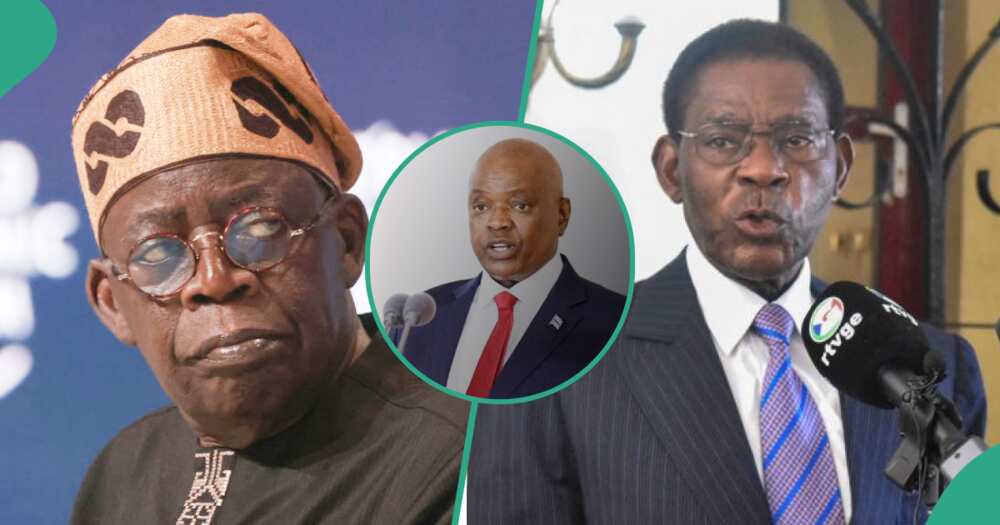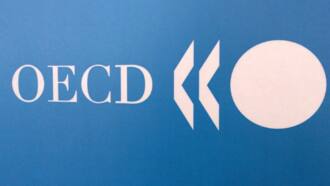New Report Ranks Nigeria among 10 African Countries with Least External Debt Burden in 2024
- Nigeria is ranked among one of the 10 African countries with the least external debt burden in 2023
- Nigeria’s external debt as of December 2023 stands at $31.98 billion, which is about eight per cent of its GDP
- Other countries on the list are Equatorial Guinea, Namibia, Democratic Republic of Congo and Zimbabwe, among others
PAY ATTENTION: The 2024 Business Leaders Awards Present Entrepreneurs that Change Nigeria for the Better. Check out their Stories!
Legit.ng’s Pascal Oparada has reported on tech, energy, stocks, investment and the economy for over a decade.
Despite being perceived by citizens as one of the most heavily indebted African countries, a recent report ranked Nigeria among the countries with the least debt burden in 2024.
Nigeria's debt-to-GDP ratio is the second lowest in Africa, with an external debt of $41.59 billion or N31.98 trillion as of December 2023.

Source: Getty Images
Nigeria's public debt hits N97.34 billion
A recent report indicates that Nigeria is in the bottom 10 of the least indebted African countries going into 2024.
According to the Debt Management Office (DMO), the country's total debt burden is about N97.34 trillion.
While many African countries are burdened with huge external debts, others have managed to keep their debt burdens to a minimum.
According to the IMF, the most crucial metric in calculating a country’s debt is its GDP, and when a country’s debt equals its GDP, the country faces an economic challenge.
Nigeria is the least indebted externally
African countries with low debt burden are better positioned to attract investment and more facilities from foreign and domestic debtors.
These countries have little debt burden and do not pose economic risks to lenders.

Read also
South Africa, Egypt, 9 others rank high as African countries with highest paying jobs for immigrants
Countries can also efficiently allocate resources for debt repayment as governments have lower debt obligations. The government has more room to allocate funds towards vital social services, infrastructure development, and investments in human capital.
Here are the 10 African countries with the least external debt
Equatorial Guinea
As of March 2024, the country has zero external debt burden going into 2024, but there are predictions that the country’s national debt might hit $1.2 billion before the end of the year,
Botswana
As of March 2024, the country’s gross general debt stock, including public guarantees, is expected to be around 21% of its GDP in 2024.
The country’s central bank expects its debt burden to remain stable in the coming years, with foreign currency-denominated debt making up 50% of total government debt.
Chad
The International Monetary Fund (IMF) said Chad’s external debt service-to-revenue ratio is expected to drop below 14% in 2024, reducing the country’s risk of external debt distress.

Read also
Recapitalisation: Zenith, Access, Other Banks That Have Moved to Raise Capital Ahead of CBN Deadline
The IMF also predicts that Chad’s public debt will decline from 56% of GDP at the end of 2021 to about 40% in 2024.
Ethiopia
Ethiopia’s external debt as of March 2024 stands at $28.2 billion, including a $1 billion Eurobond that matures in December this year.
Fitch Ratings estimates that the country will earn $1 billion in sovereign external principal and interest payments in the fiscal year ending July 7, 2024.
Democratic Republic of Congo
According to the IMF, DR Congo has outstanding purchases and loans of 1446.8 million SDR. In 2021, the country’s external debt was 18.6% of its GDP, lower than the Sub-Saharan Africa average of 32.9%.
Fitch Ratings expects DRC’s external amortisations to reduce to 4.7% of GDP in 2024 and 4.2% in 2025.
Namibia
Namibia’s external debt is projected to be about $17.2 billion in 2024, a decrease from 2023 when it was about $18 billion.
Its external debt is expected to increase by $2.9 billion between 2024 and 2029, reaching around $11.29 billion by 2029.
Namibia’s government has set aside 12.8 billion Namibian dollars to meet debt service obligations in the 2024/2025 fiscal year, about 14.2% of its revenue and 4.7% of GDP.
Mauritius
By June 2024, the country’s public debt is expected to be 71.5% of its GDP. The country’s statistics body says the figure is a decline from 86.1% in June 2022, and the debt-to-GDP ratio has been declining in 2020/2021.
Guinea
The World Bank says Guinea’s debt-to-GDP ratio is expected to reduce to 35.3% in 2024 due to reduced domestic debt. The bank also forecasts that the country’s debt-to-GDP ratio will average 32% from 2025 to 2026.
Zimbabwe
Zimbabwe’s external loan payments are expected to be about $868.7 billion. Still, they could double due to the depreciation of the Zimbabwean dollar against the US dollar, which has now been changed to ZiG.
The country’s external debt to GDP is projected to be around 100% in 2024 and 90% in 2025.
Nigeria ranks among the 10 least indebted African countries
Legit.ng earlier reported that the International Monetary Fund (IMF) said about 10 African countries still have manageable debts compared to their GDP.
The report ranks Nigeria among the countries in Africa with low debt compared to its GDP despite Nigerians' calls for the government to tame its appetite for borrowing.
Nigeria's debt profile recently hit N87 trillion, with the federal government saying it will convert CBN's Ways and Means Advances to loans.
PAY ATTENTION: Donate to Legit Charity on Patreon. Your support matters!
Source: Legit.ng



